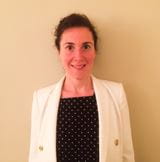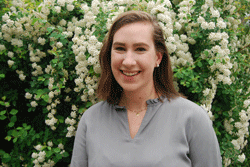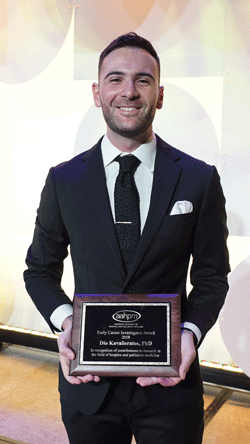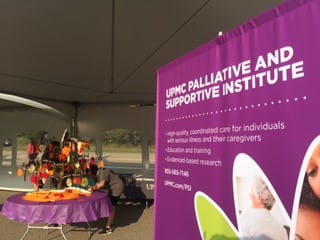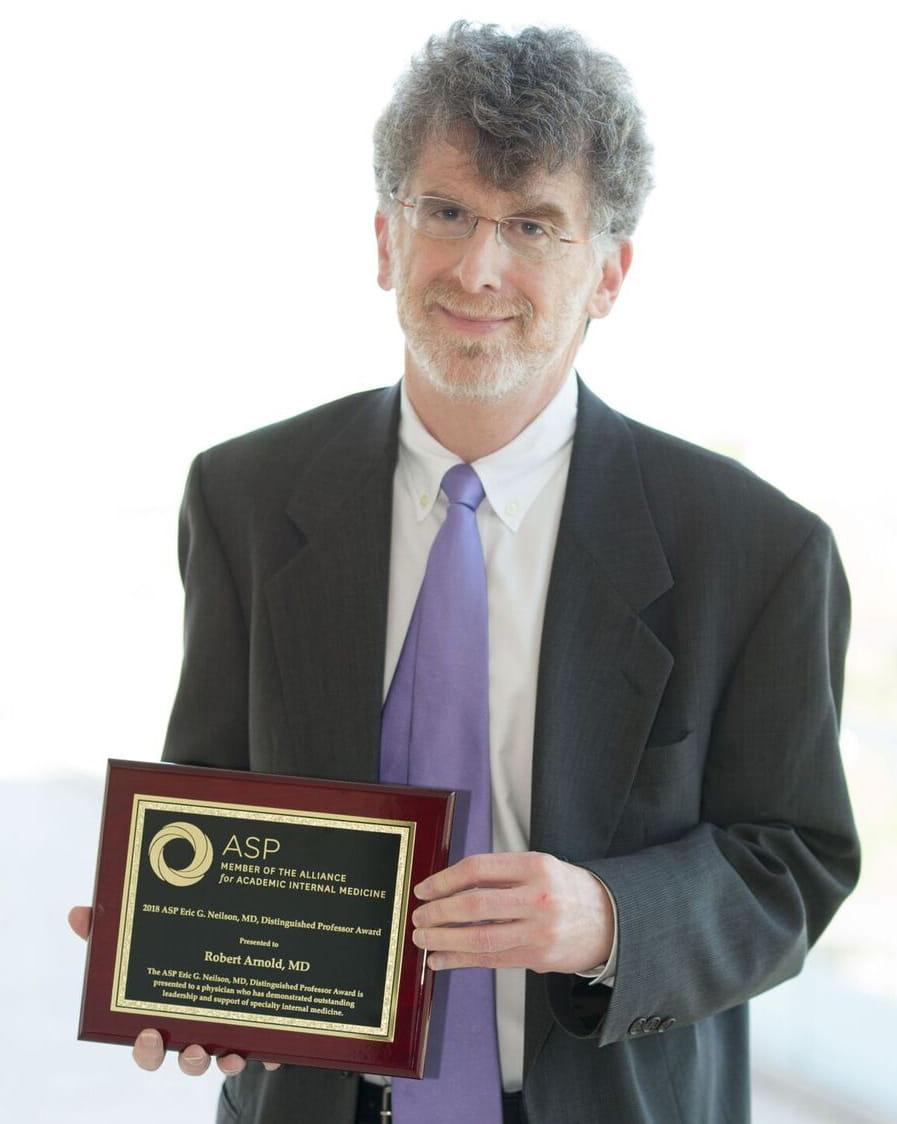American Academy of Hospice and Palliative Medicine Annual Assembly
The American Academy of Hospice and Palliative Medicine's Annual Assembly and State of the Science conferences took place March 20 to 24 in Phoenix, AZ. The conferences bring together thousands of palliative care clinicians and researchers. The Section of Palliative Care and Medical Ethics and PaRC had a very successful year. PaRC and Section faculty, trainees, mentees, and clinicians presented 24 sessions and posters.
Hitoshi Koshiya, MD, from UPMC Children’s Hospital of Pittsburgh, won the AAHPM Annual Assembly Early Career/Professional In Training Scholarly Work-in-Progress Study Poster Award for "A National Survey Describing Management Patterns for Pediatric Paroxysmal Sympathetic Hyperactivity (PSH)," with support from mentor Justin Yu, MD.
Learn more and view additional event photos.
Palliative Care Fellows Invited Speaker Series
In May, the Section of Palliative Care and Medical Ethics welcomed Nneka Ufere, MD, as the first fellow-invited speaker for Palliative Care Grand Rounds. Dr. Ufere presented "Increasing Healthcare System Empathy of Patients with Cirrhosis: My Top 10 Lessons in Palliative Hepatology."
Rush to Crush Cancer
Amar Bansal, MD, Shannon Joy, MSN, and Charles T. Mupamombe, MD, completed the 30-mile bike race benefiting UPMC Hillman Cancer Center in May. They have raised more than $1,300 for the cause to date.
Pomp and Circumstance
Sara, a bubbly, forward-thinking college student, was finishing her last semester at Gonzaga University and about to secure a degree in music education when she became ill. What originally presented as the onset of stroke symptoms ultimately proved to be cardiomyopathy.
Sara and her mother relocated to Pittsburgh to pursue treatment at UPMC. Tammy Brinker, CRNP, palliative care, met Sara early on when Sara was an outpatient at the UPMC Heart and Vascular Institute. At the time, Sara was being evaluated for a heart transplant.
Sara had plans, including graduation and teaching, that were quickly interrupted when the transplant proved necessary. Tammy was part of the multidisciplinary team that supported Sara along this path.
"The adjustment to a new normal is key for this population," Tammy says. "Affirmation and validation are so important. Sometimes, we are too quick to label someone as depressed or anxious."
With the guidance of her team and a professor from Carnegie Mellon University, Sara charted a new course for herself.
Because the risk of exposure to infection is high as a teacher, Sara pivoted and secured her undergraduate degree in music. Come fall, she will begin pursuing a master's degree in social work. She hopes to explore working with pediatric transplant patients.
MusiCare
Rhiannon Rieger, MMT, music therapist, palliative care, facilitated an enrichment activity for 21 medical students who volunteer with MusiCare. These student volunteers lend their musical talents to small group performances at patient request in various clinical environments.
The students learned about what music therapy is and is not, particularly in the palliative setting. They also learned when to consider patient referrals to board-certified music therapists. Additionally, students participated in a therapeutic music-making experience with drums and other small percussion instruments.
Psychiatry Woven Through Palliative Care
Elizabeth Hale, MD, is a clinical assistant professor of psychiatry at the University of Pittsburgh School of Medicine. Dr. Hale is part of the inpatient palliative care psychiatry consult service two days a week at UPMC Presbyterian. She also works in the outpatient setting at the Center for Counseling and Cancer Support at UPMC Hillman Cancer Center.
On the inpatient side, Dr. Hale works with consultation-liaison psychiatry fellows and psychiatry residents. The palliative care psychiatry service is consulted for many clinical presentations. This includes patients who may be experiencing psychiatric symptoms that occur in the medical setting, including:
- Anxiety.
- Delirium.
- Dementia.
- Depression.
- Trauma or post-traumatic stress disorder (PTSD).
Dr. Hale notes that it is a unique role to be part of a multidisciplinary medical team.
"The best part of my role is getting to support patients with the benefit of such a dynamic team," Dr. Hale says.
Dr. Hale is available to any team members for curbside discussions or debriefing around challenging clinical cases. She also facilitates a process group for the hospice and palliative medicine fellows.
Beyond structured education in the psychiatry residency and hospice and palliative medicine (HPM) fellowship, Dr. Hale's educational interests include psycho-oncology, physician well-being, trauma-informed care, and consultation-liaison psychiatry.
"Education is such an important aspect of palliative care," Dr. Hale says. "I value the opportunity to collaborate in reaching new audiences."
Palliative Fellows Graduation
Congratulations to our recently graduated palliative care fellows: Vasili Bushunow, MD, Rebecca Ellis, MD, Taylor Huntington, MD, Amit Pujari, MD, and Courtney Wagner, MD.
Program director Ethan Silverman, MD, described the graduates as "a truly special class of fellows. What emerged from their diverse backgrounds and experiences was a spirit of curiosity and an interest in learning to not only grow as individuals, but to have the entire Section grow. They are now a fantastic representation of alumni!"
Teach Like a Champion (TLAC)
Palliative Care medical education faculty are working with the Teach Like a Champion (TLAC) organization to integrate equity-focused and evidence-based teaching strategies in palliative care education. Active learning strategies increase overall learner performance and narrow achievement gaps in STEM fields.
"The goal is an engaged classroom," says Rene Claxton, MD, director, palliative care undergraduate and graduate medical education, University of Pittsburgh Department of Medicine. "Since its introduction to palliative care teaching here at Pitt, our classrooms are much more lively, more energetic, and students are participating to a higher degree."
TLAC representatives visited the university in December 2023 to observe, record, and provide feedback on faculty teaching. During this visit, TLAC faculty videorecorded PalliTalk. The national TLAC medical educator course is now using video clips of the PalliTalk teaching of
Ethan Silverman, MD, and
Kendall Downer, MD, as exemplar videos.
Ubuntu Pittsburgh Project
This spring, Justin Yu, MD, and Margaret Rosenzweig, PhD, launched the Ubuntu Pittsburgh Project with support from The Pittsburgh Foundation. This initiative seeks to train and empower nonordained leaders within the Black faith community to provide enhanced support and advocacy to Black women living with metastatic breast cancer in Pittsburgh.
Pharmacy Collaboration Improves Patient Experience
Maria Lowry, PharmD, palliative care clinical
pharmacy specialist, established a transitions
of care clinic to support a smoother transition
between the hospital stay and home as it
pertains to managing medications. Maria
explained, “Many of our patients have a long
list of complex medications where medication
misadventures can occur. My goal was to
minimize readmissions due to medications,
unmet symptom needs, or medication errors.”
Referred to as “Palliative Care Interventions
surrounding Medication Prescribing Across
Care Transitions (IMPACT),” the collaborative
initiative included the inpatient palliative care
team at UPMC Shadyside, outpatient palliative
care team at UPMC Hillman Cancer Center,
and palliative care clinical pharmacist. Patients
contacted in the early post hospital discharge
period through the “IMPACT” program yielded
a reduction in seven-day readmission rates
compared to those patients who were not
contacted by the pharmacist.
Maria summarized, “This highlights the
medical complexity of this patient population
and the need for short-term follow-up to
improve symptom burden and educate
patients on their medications following
hospitalization. These results could be related
to a patient’s better understanding of
expectations surrounding pharmacologic
therapy.”
Palliative Care Curriculum for Nurses
Donna Durant, senior CRNP, is pursuing her
DNP at Duquesne University. As part of her
coursework, Donna is developing a curriculum
for nurses specific to palliative care.
In response to what she sees in the clinical
setting, Donna is using her further education
as an opportunity to research why nurses feel
distress, moral injury, and overall stress. Her
interest is to “meet bedside nurses where they
are and guide them to find meaning and joy
on the difficult days,” describes Donna. For
example, to combat intense moral stress,
Donna advises nurses to ‘ink shed,’ meaning to
write about the day, their work, and their
feelings and to find release in that creative
outlet.
Her research identified the lack of
standardized hospice or palliative care training
being taught to nurses at orientation or in
residency. Additionally, she recognized that
many new nurses had never experienced a
patient death.
These findings are informing her curriculum to
create a better experience for both patients
and nurses. Says Donna, “My hope is that we
can integrate finding moments of joy and
meaning into all settings, and I am actively
advocating for more understanding around
palliative care. This knowledge should be
available to all nurses who meet patients with
serious illness.”
Church Initiative Update
PaRC researchers and Section clinicians partnered with
Macedonia Church of Pittsburgh to strengthen church lay
ministers’ understanding of advance care planning and other
topics related to aging and illness. Justin Yu, MD, MS, along
with Amanda Tompkins, MD, and Mikisa Solomon, MD, and
other members of the UPMC palliative care team presented
information to the group, and learned how Pittsburgh
clinicians can better support the Macedonia community. We
are grateful for this partnership and are looking forward to
expanding this program throughout the city.
Pathways to Palliative Care
Students and faculty from University of Pittsburgh’s Schools of
Medicine, Nursing, Pharmacy, Social Work, and Public Health
gathered in November 2023 to enjoy an evening of palliative care
research storytelling followed by speed networking. A special
thank you to Gina Piscitello, MD, MS, Justin Yu, MD, MS, and
Margaret Rosenzweig, PHD, CRNP-C, AOCNP, FAAN, for sharing
their inspiring real-life research stories.
“If we want patients to trust us, we have to tell them what’s going
on,” said Dr. Piscitello.
Learn more about Pathways to Palliative Care.
Gleitsman Scholars Program
Congratulations to our 2024 CARE-Gleitsman scholars: Delma Mbulaiteye (Howard), Akiera Palm (Morehouse), Stephania Luna (Charles Drew), and Gabriella Forchion (Ponce Health Sciences). They are engaging in supportive oncology and palliative care research this summer with their mentors at UPMC Hillman Cancer Center and the University of Pittsburgh. Learn more about these exceptional scholars and the program.
Interprofessional in Nursing
PaRC core faculty member Jennifer Seaman, PhD, is currently leading the McElhattan Foundation-funded program, "Equipping Frontline Providers to Deliver High-Quality End-of-Life Care: Interprofessional Certificate and Continuing Education Program for End-of-Life Care and Communication."
This program is designed to build primary palliative care capacity among clinician leaders and frontline health care workers across the tristate region (Pennsylvania, Ohio, West Virginia) and nationally.
The 12-credit program offers an interprofessional post-baccalaureate certificate in end-of-life care and communication. It includes courses for:
- Allied health professionals, such as physical therapists, occupational therapists, and social workers.
- Bedside nurses.
- Nonlicensed personnel, such as patient care technicians.
- Nurse leaders.
The goal is to facilitate the development of expert primary palliative care skills. Additionally, continuing professional development modules will advance the knowledge and skills of nurses and other frontline health care personnel, such as patient care technicians, in various settings where end-of-life care is delivered, including:
- Assisted living facilities.
- Hospitals.
- Skilled nursing facilities.
Faculty Spotlight
Hailey W. Bulls, PhD, is a licensed clinical psychologist and assistant professor of medicine. She is the associate director of the CHAllenges in Managing and Preventing Pain (CHAMPP) Clinical Research Center and core faculty member at the Palliative Research Center (PaRC).
Dr. Bulls received a National Cancer Institute K08 grant for her project titled "Development and Piloting of an Intervention to Reduce the Impact of Opioid Stigma in Cancer Pain." She is dedicated to advancing solutions in pain management. Her current research focuses on mitigating the impact of opioid stigma on cancer patients with pain, with an emphasis on health equity; early identification of cancer patients at risk for pain and neuropathy; and novel behavioral interventions to better manage pain.
Recognized for her exceptional contributions, Dr. Bulls received an honorable mention for the National Institute of Health HEAL Director’s Trailblazer Award. She also was selected for the Society of Behavioral Medicine's Monica Baskin Diversity Institute for Emerging Leaders in 2023. She presented "To Prescribe or Not to Prescribe: That is the Question" at the Senior Vice Chancellor’s Research Seminar in February 2024.
Stay updated on her groundbreaking research. Follow @hwbulls on Twitter/X and check out her bibliography.
Amar Bansal, MD, works as both a palliative
care and nephrology physician and is the
associate program director for Nephrology. He
has been selected as a winner of the UPMC
Physician Excellence in Clinical Care Award in
the Early-to-Mid-Career category.
Dr. Bansal excels as a clinician, educator, and
mentor. Feedback from his patients, peers, and
mentees speaks to an aspirational level of
professional integrity and dedication to his
patients, many of whom live with complex
medical conditions. He demonstrates
exceptional skill at tailoring his teaching to the
needs of his learners and is an outstanding and
compassionate advocate for his trainees as well
as his patients.
He is described as one who leads by example in
managing challenging situations with tact and
equanimity and inspires everyone he meets to
strive for a culture of excellence. Additionally,
he has taken measures to promote physician
wellness within his division, soliciting feedback
and implementing innovative and beneficial
initiatives.
Gina Piscitello, MD, MS, had a busy year as a
research fellow at the Palliative Research
Center. Dr. Piscitello was named a fellow of the
Beckwith Center for Shared Decision-Making
Physician Fellowship in September and
published four first-author manuscripts in
journals including JPSM, Critical Care Medicine
and Chest.
Read Dr. Piscitello’s research here. In addition,
Dr. Piscitello spoke at conferences and events
throughout the year, including the American
Society for Bioethics and Humanities 25th
Annual Conference. Her research and
presentations focused primarily on improving
equitable delivery of healthcare in the context
of serious disease.
Dr. Piscitello transitioned from research fellow
to assistant professor of Medicine in the
Department of Medicine, Division of General
Internal Medicine, Section of Palliative Care and
Medical Ethics at the University of Pittsburgh as
of January 2024.
Awards
Donna Durant, CRNP, palliative care, UPMC Presbyterian, received the UPMC Award for Commitment and Excellence in Service (ACES) for 2023. ACES recipients are recognized for embodying UPMC's core values, exhibiting excellence in and dedication to their work, and going above and beyond to serve our patients and communities.
Douglas B. White, MD, professor, critical care medicine, medicine, and clinical translational science, was elected to the Association of American Physicians (AAP).
Colleen Hutzel, LSW, and Cathy Calkins, CRNP, palliative care, UPMC Presbyterian, received the Daisy Team Award. The award recognizes nurses for their part in the excellent care and compassion shown toward patients and families. Colleen is honored to have been nominated as a social worker alongside Cathy.
Maria Felton Lowry, PharmD, palliative care clinical pharmacy specialist, UPMC, and assistant professor, pharmacy and therapeutics, University of Pittsburgh School of Pharmacy, has received the:
- 2024 Richard L. Simmons, MD, Speak Up for Patient Safety Award in recognition of her passion for patient safety while providing care.
- 2024 Tara E. Cook Memorial Teaching Award for her commitment to excellence in medical education.
- Scott R. Drab University of Pittsburgh School of Pharmacy Preceptor of the Year award, as selected by the Class of 2024, for her dedication to the students, the university, and the profession.
Sarah Belcher, PhD, RN, OCN, received a Clinical Research Loan
Repayment Award from the National Cancer Institute and Kelly
Harris, MD, MS, was selected for the NIH Loan Repayment
Program through NHLBI.
Rene Claxton, MD, received the inaugural Robert Arnold
Teaching and Mentoring Award as well as the Tara E. Cook
Hospice and Palliative Medicine Annual Teaching Award in
recognition of her exceptional efforts in this regard.
Sherry Gunn, LCSW, senior social worker, palliative and
supportive care, UPMC Mercy, was chosen as a UPMC ACES
Winner. The ACES Award honors staff who exemplify UPMC’s
core values.
Yael Schenker, MD, MAS, FAAHPM, was selected as a 2023
recipient of the Merrill J. Egorin Excellence in Scientific
Leadership Award which honors UPMC Hillman Cancer Center
Research faculty members who display biomedical expertise,
scientific passion, and scholarly dedication.
Yael Schenker, MD, MAS, FAAHPM, has been appointed the new
section editor for Symptom Control and Palliative Care for the
journal Cancer.
Spotlight on GeriPal Podcasts
Jessica Merlin, MD, was featured on the GeriPal podcast episode " Substance Use Disorder in Aging and Serious Illness." Dr. Merlin was also interviewed on KDKA Radio's The Rick Dayton Show on " The Relationship Between Cancer Recovery and Addiction."
Teresa Hagan Thomas, PhD, associate director, mentorship and nursing research, Palliative Research Center, and Yvette Dudley Morissey, research coordinator, were featured on KDKA+'s Intersections. They discussed patient self-advocacy and how people can develop skills to improve their care.
Karen Moss, PhD, RN, CNL, a 2023 participant in the PaRC Junior
Faculty Visiting Professor Program, shared her insights during
her visit to the University of California San Francisco: Black/African American Caregivers of Older Adults Living withDementia: Fayron Epps and Karen Moss (geripal.org)
Robert Arnold, MD, discussed his article, “The Language of Serious Illness” on GeriPal.
Select Publications
Mamta Bhatnagar, MD, and Maria Lowry, PharmD, are contributors to Description and Outcomes of a Palliative Care Pharmacist-Led Transitions of Care Program in the Journal of Palliative Medicine.
Hailey Bulls, PhD, and Sarah Bell, MD, are collaborators on Cancer, To Prescribe or Not to Prescribe: That Is the Question.
Jessica Merlin, MD, PhD, MBA, shares authorship of An Observational Study of Dialogue about Uncertainty in Clinician-Family Counseling Conversations Following Prenatal Diagnosis of Complex Congenital Heart Disease published in PEC Innovation.
Sarah Bell, MD, Douglas White, MD, and Yael Schenker, MD, MAS, are contributing authors to Associations of Health Care Utilization and Therapeutic Alliance in Patients with Advanced Cancer in the Journal of Hospice and Palliative Medicine.
Jennifer Seaman, PhD, Teresa Thomas, PhD, Risa Wong, MD, Maria Belin, MLIS, and Dr. Schenker collaborated on Implementing a Palliative Care Junior Faculty Visiting Professor Program: Pearls and Pitfalls in the American Journal of Hospice & Palliative Medicine.
Hailey Bulls, PhD, Yael Schenker, MD, MAS, FAAHPM, and
Jessica Merlin, MD, PhD, MBA, published “I Refused to Get Addicted to Opioids” in The Journal of Pain.
Drs. Arnold, Bulls, and Merlin published “Expert consensus-basedguidance on approaches to opioid management inindividuals with advanced cancer-related pain andnonmedical stimulant use.”
Dr. Schenker’s essay, “Talking About Dying,” was published in
JAMA Internal Medicine.
Dr. Rosenzweig’s article, “Effects of Socioeconomic Status andRace on Survival and Treatment in Metastatic Breast Cancer,”
was recently published in NPJ Breast Cancer.

















